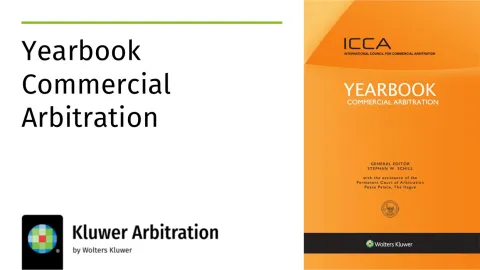Section 68(2)(g) After Nigeria v. P&ID: High Threshold for Public Policy Set-Aside Applications
November 5, 2025
Following the widely discussed High Court decision in Nigeria v. Process & Industrial Development (“Nigeria v. P&ID Decision”) (see Blog coverage here and here), Justice Robin Knowles has once again considered a challenge to an LCIA award under Section 68 of the 1996 Arbitration Act.
In this latest case, the applicants challenged the award alleging that the underlying contract constituted a “contract for fraud” and that the award was therefore contrary to public policy within the meaning of Section 68(2)(g). The application was denied (the “Decision”).
This article summarizes the background to the award and explains how Justice Knowles’ reasoning diverged from that in the Nigeria v. P&ID Decision. It highlights the high threshold for setting aside awards on public policy grounds when the alleged illegality pertains to the merits rather than the integrity of the arbitral process.
The LCIA Arbitration
Public information about the underlying LCIA arbitration is limited.
As set out in the anonymized Decision, the arbitral tribunal rendered the award on 10 April 2024, awarding USD 3.2 million to Respondent. The amount was awarded based on a success fee for services set out in the engagement letter signed by Respondent on 28 May 2018 (the “LoE”). The LoE provided for an LCIA arbitration, seated in London, and governed by English law.
The Claimants initially challenged the award, disputing the Tribunal’s jurisdiction on the basis of Section 67 of the 1996 Arbitration Act. This jurisdictional challenge is currently pending.
On 16 April 2025, the Claimants sought permission to amend their arbitration claim form to also challenge the award under Section 68(2)(g) of the 1996 Arbitration Act. Claimants argued that there was a serious irregularity affecting the award, falling within the Section 68(2)(g) case, i.e., “the award being obtained by fraud or the award or the way in which it was procured being contrary to public policy”. They contended that the LoE constituted a “contract for fraud”, asserting that the services contemplated under the LoE pertained to “obtaining information from targets by deception”, where the targets were foreign state officials and authorities possessing confidential information related to a foreign Ministry and Authority. The “contract for fraud” argument was not raised in the arbitration, but according to Claimants, the nature of the allegation had serious public policy implications and rendered the award contrary to public policy. Respondent denied all accusations of illegality.
The High Court Decision: Application of Section 68(2)(g) Principles and Comparison with the Nigeria v. P&ID Decision
Before going into the merits of the Decision, Justice Knowles referred to his previous Nigeria v. P&ID Decision concerning the scope of Section 68(2)(g), emphasizing that Section 68(2)(g) is of:
“fundamental character to the arbitration process because it goes to the integrity of that process. […] An award obtained by fraud or contrary to public policy (or procured in a way that was contrary to public policy) and which has caused or will cause substantial injustice is not what the parties agreed to when they agreed on arbitration” (Nigeria v. P&ID Decision, para. 476).
Crucially, and always referring to the Nigeria v. P&ID Decision, Justice Knowles drew an important distinction between the claim on which the award is based (or the cause of action on which the claim is based) and the parties’ conduct in the arbitration and the process that ultimately led to the award. Section 68 is solely concerned with the latter (para. 474 in the Nigeria v. P&ID Decision; paras. 13-14 of the Decision).
Against that framework, Justice Knowles found that the fraud argument pertained to the merits of the contract claim and therefore fell squarely within the arbitral tribunal’s remit. This issue was not one for the High Court.
In the LCIA arbitration, there was no indication that the conduct of the arbitration or the process itself was interfered with. While the Claimants argued that no amount should have been awarded given the LoE was a “contract for fraud” and illegal, the arbitral tribunal did not reach that conclusion. As confirmed in Lesotho v. Impregilo, Section 68 does not allow for a re-examination of the merits:
“nowhere in Section 68 is there any hint that a failure by the tribunal to arrive at the ‘correct decision’ could afford a ground for challenge under Section 68”.
Aware of this limit, the Claimants attempted to recast their case, stating that while Section 68(2)(g) was not “procedural in nature”, it allowed for a residual case where the award could still be “objectionable” on public policy grounds. The Claimants contended that it would be difficult to imagine a situation where an award is contrary to public policy, but the procedure was not.
Justice Knowles rejected that proposition, stating that the Nigeria v. P&ID Decision served as an example of such a situation. In that case, the parties concluded a contract, but one party’s intention was not to perform it; rather, it was to use the contract purely as a vehicle to obtain an award or settlement. This was deemed a “very different case” (as stated in the Nigeria v. P&ID Decision), where the contract served as an initial step in executing a preconceived fraudulent scheme to secure an award from the outset. In such circumstances, the award itself would be contrary to public policy because it was the very object of the fraudulent plan.
The Claimants did attempt to argue that the LCIA award fell into this “very different case”, contending that the illegality of the LoE and the manner of its performance could lead to the conclusion that the award was procured by fraud and formed part of an “overall fraudulent enterprise”. However, Justice Knowles found no comparable elements in the LCIA award at issue.
The circumstances in the Nigeria v. P&ID Decision all related to the arbitration process (defined as “central” to Nigeria’s challenge under Section 68, see para. 497). None of these circumstances could be translated to the present case. For example:
- P&ID provided and relied on material evidence before the tribunal that P&ID knew to be false;
- P&ID’s continued bribery or corrupt payment of Ms. Grace Taiga during the arbitration period in order to suppress from the tribunal and Nigeria the fact that Ms. Grace Taiga was bribed when the contract came about. This was fairly described by Nigeria as bribery “to keep her ‘on-side’, and to buy her silence about the “earlier bribery” and the fact that the contract was passed with no proper scrutiny; and
- P&ID’s improper retention of Nigeria’s “Internal Legal Documents” received by P&ID during the arbitration to monitor Nigeria’s position and awareness. This provided insight into its decision-making process, including monitoring whether Nigeria had become aware of the deception being practised by P&ID on the tribunal and on Nigeria as a party before the tribunal (para. 496 Nigeria v. P&ID Decision).
Finding no similar elements in the present case, Justice Knowles dismissed the application to amend the form and to add a Section 68(2)(g) challenge.
Conclusion
This decision by Justice Knowles reaffirms the high bar for challenging arbitral awards under Section 68(2)(g) of the Arbitration Act, particularly when allegations of fraud or public policy contravention arise. While the Nigeria v. P&ID Decision gained notable public attention, it serves as proof that exceptional circumstances underlying the arbitration proceedings were necessary for a successful challenge. Here, Justice Knowles was not tasked with deciding an application where the arbitral tribunal had found the LoE to be a “contract for fraud” or illegal, yet had still issued the award, and no argument was put forward that the tribunal should have inquired into the nature of the LoE.
By distinguishing between procedural irregularities in the arbitration process and substantive challenges to the underlying contract’s legality, the Decision underscores that Section 68 focuses on the integrity of the arbitral proceedings itself, rather than the merits of the dispute or contractual validity. While the Nigeria v. P&ID Decision established that awards procured through fraud impacting the arbitral process can be set aside, this case clarifies that mere allegations of an illegal underlying contract, not affecting the procedural fairness or integrity of the arbitration, are insufficient grounds for a Section 68 challenge.
This reinforces the principle of minimal curial intervention and the finality of arbitral awards in the UK. As set out in paragraph 280 of the 1996 Report on the Arbitration Bill of the Departmental Advisory Committee on Arbitration Law (referred to in RAV. Bahamas v. Therapy Beach Club, cited by Justice Knowles), Section 68 is “only available in extreme cases where the tribunal has gone so wrong in its conduct of the arbitration that justice calls out for it to be corrected”.
You may also like










